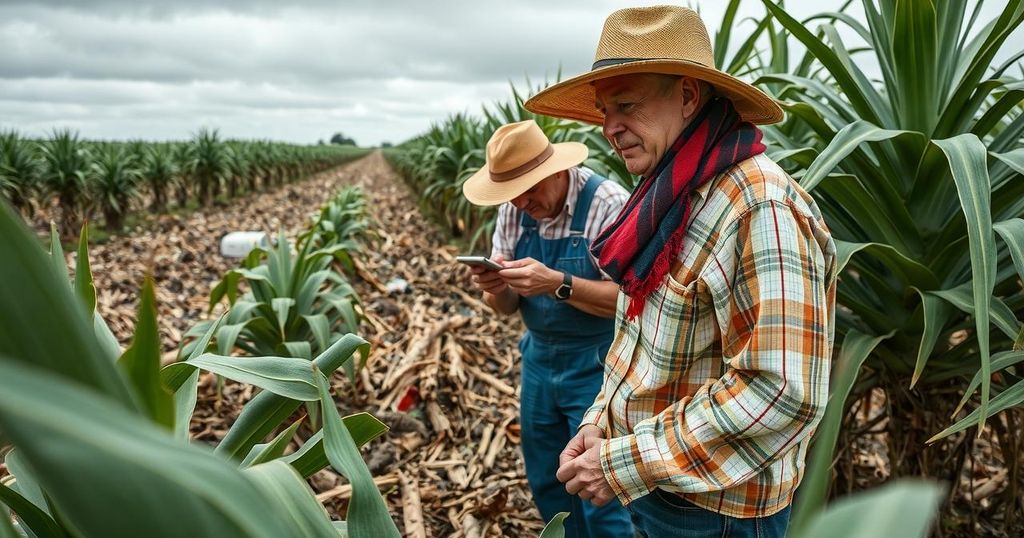Hurricane Helene Leaves Southern Farmers Facing Devastating Losses
Farmers remain affected by the aftermath of Hurricane Helene, which struck in September. The storm caused over $10 billion in damages across the South, with Georgia alone estimating $5.5 billion in losses. Cotton growers were especially impacted during the critical harvest season, with many farmers losing near half of their crop. Recovery efforts are underway, yet challenges such as limited state aid and the emotional toll on farmers persist.
Farmers continue to grapple with the aftermath of Hurricane Helene, which devastated crops across the Southern United States. The storm, classified as a Category 4 hurricane, struck Florida on September 26 before moving northward, causing extensive damage in states like Georgia and North Carolina. Chris Hopkins, a farmer in Georgia, described the emotional toll, stating, “I have wrestled with lots of emotions the past two months.” Over $10 billion in losses are anticipated across the regions affected, with cotton growers particularly hard-hit as the hurricane coincided with the critical fall harvest time.
The University of Georgia estimates that Georgia alone suffered storm-related losses of at least $5.5 billion, while North Carolina reported losses of $3.1 billion. Additionally, Virginia, South Carolina, and Florida incurred losses ranging from hundreds of millions to billions. Farmers like Hopkins lost approximately half of their cotton harvest, with many left with significant financial repercussions despite having insurance.
Further compounding the difficulties, the hurricane destroyed infrastructure essential for agricultural production, including poultry houses and grain bins. As recovery efforts continue, Georgia’s government has redirected state funds to support farmers, but constitutional limitations impede direct disaster aid. There have been calls for quicker federal assistance, highlighted by an upcoming spending bill aimed at providing $21 billion in disaster aid for farmers.
The devastation of Hurricane Helene serves as a severe reminder of the vulnerabilities faced by the agricultural sector in the face of natural disasters. While the short-term impacts on consumer prices may be limited, the longer-term consequences for farmers could be profound, necessitating a collective response for recovery.
Hurricane Helene, which made landfall on September 26 as a Category 4 storm, significantly impacted agricultural sectors across the Southern United States, particularly in states like Georgia and North Carolina. The hurricane’s timing coincided with crucial harvest seasons, affecting crops such as cotton, pecans, and fall vegetables. The storm caused an extensive financial toll not only due to damaged crops but also through the destruction of farming infrastructure, which is critical for production and economic viability in the region. The implications of these losses extend beyond individual farmers, affecting local economies and food supply chains.
In conclusion, Hurricane Helene has left a lasting impact on farmers across the Southeastern United States, with billions in estimated losses and significant challenges in recovery. Farmers are left to navigate emotional and economic difficulties in the wake of the devastation, and while immediate assistance is being organized, long-term recovery will require both community resilience and ongoing support from government officials and organizations. As the situation develops, it is vital to ensure that farmers receive timely aid to facilitate their recovery efforts and sustain agricultural production entering the future.
Original Source: www.agrinews-pubs.com




Post Comment